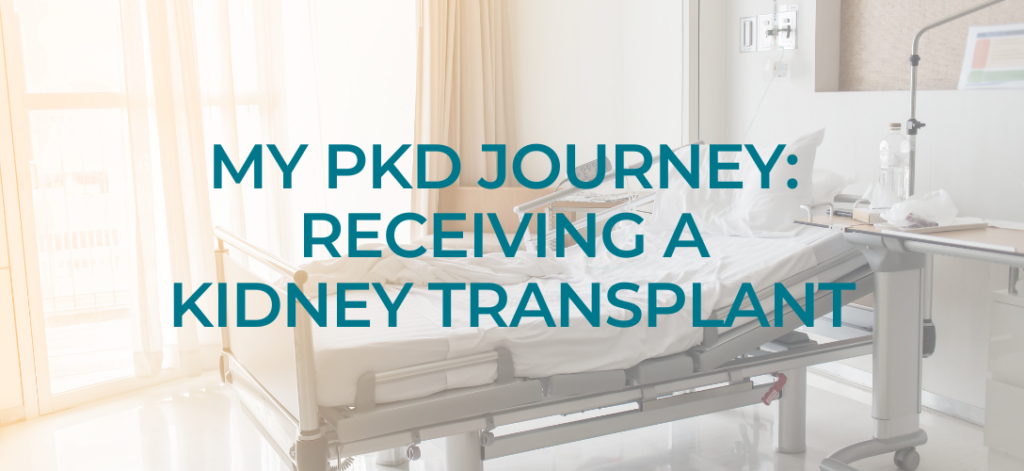
Published September 15, 2020 | With an ADPKD diagnosis, there’s more than a 50% chance a patient will develop kidney failure by age 50. Dialysis or a kidney transplant is the only treatment option once a person has kidney failure. Choosing to pursue a kidney transplant can be a long process, but as Martin Voet will tell you, it’s well worth the wait. This is the story of his path to transplantation that began in 2019.
Tell us a little bit about your journey with PKD. When were you diagnosed?
Martin: I first found out that I had PKD about 35 years ago when an elderly uncle of mine was in the hospital for unrelated reasons and was told he had cysts on his kidneys. My mother died of a brain aneurism some years earlier and we put two and two together. We discovered that my brother and I both had PKD, while my two sisters did not. Since then, we’ve learned several cousins on my mother’s side also have it.

Martin two years ago on a gorilla trek.
How did your kidney transplant journey begin?
Martin: I had a relatively mild case [of PKD], so I followed its progression annually from then to the present. In 2018, my GFR hit 23% so time was getting short. In early 2019, my GFR hit 19% and my nephrologist referred me to the Mayo Clinic in Arizona, as I live in Southern California. The waiting list for a deceased kidney in Arizona is half that of California, so it seemed like a good idea. I was tested by Mayo in the spring of 2019 and approved as a recipient.
I received my transplant at age 77. Older patients are often refused or discouraged from getting transplants at many transplant centers for a variety of reasons, but I was able to get a transplant at Mayo Clinic in Arizona, who accepts patients based on need and health rather than age alone.
How did you prepare for your transplant surgery? Did the pandemic impact your surgery?
Martin: Susan DeRemer, from the PKD Foundation, mentioned a woman named Risa Simon who might be helpful. She’s the author of In Pursuit of a Better Life: The Ultimate Guide for Finding Living Kidney Donors. I read her book and prepared a “dear friends and family” letter explaining PKD and my situation. Then I sent it to everyone I knew. In response, I received four offers for a living donor. Two of the offers were rejected early due to the health issues of the proposed donors. The other two potential donors went to Mayo for a week of tests in early 2020 and one was officially qualified in March 2020. Luckily, the COVID-19 pandemic didn’t adversely affect the timing of surgery.
The only problem was my donor had a different blood type from mine, so we were incompatible. The solution to this problem is arranging a paired match where my donor’s kidney goes to someone else who needs a kidney and in return, a suitable kidney is simultaneously provided for me. This is done through a national organization called The National Kidney Registry, the nation’s most active kidney pairing donation program.
What was it like finding out you had a match for a kidney transplant?
Martin: In May of 2020, I was informed that a match had been found and surgery was scheduled for June 3. On the morning of the day of surgery, my donor had his kidney removed and sent to Wisconsin. That evening I received a kidney from a live donor in North Carolina. In paired exchanges, the identity of the living donors is kept strictly confidential, so I don’t know anything more than that.
How has life changed for you after your kidney transplant?
Martin: I was only in the hospital for two days and then in recovery at a nearby house for six weeks while they fine-tuned the meds and made sure everything was okay. I had a rapid recovery, very little pain. Now two months later, I’ve returned to an almost normal life with increased energy and a 50% GFR. The “almost” part is because of reduced immune response due to the drugs needed to prevent rejection. There are strict dietary and cleanliness rules to avoid getting sick and to maintain kidney health. A small price to pay for a dialysis-free life.
I’m playing 18 holes three times a week again and feeling great. I can’t say enough about how excellent the Mayo Clinic has been with in-patient care and follow-up.
To learn more about the kidney transplant process, visit our website.









Martin, I am so happy everything is going well for you. I am at 18% right now and just started the process. Did you have to stay at the Mayo residence house for six weeks?
Deborah,
Since I had two caregivers, we rented a nearby house for the 6 weeks. I have stayed at the Marriott Residence Inn next to the Mayo Clinic Mayo and it is great for shorter stays, but i would recommend renting a nearby house or condo for longer stays.
Martin, how wonderful for you. I had a GFR of 12 when I had my transplant in NJ. Next weekend, the 26th of September will be 3 years. Congratulations and continued good health to you!
I’m currently in a similar situation. Scheduled for a swap at the university of Illinois hospitals on Thursday. My wife, who is not the correct blood match, will donate to a mother. I will receive kidney from daughter. Very nervous, yet hopeful, about our surgeries.
Also, there is a drug called Solaris that allows one to receive a kidney from a different blood type. My insurance approved it prior to the swap. It’s quit expensive at $50k s shot x9. Yikes!
Martin, Thank you for sharing your story. My husband John had his transplant in 2005 in Houston and has maintained overall good health since. Congratulations and wishing you a bright healthy future.
My brother was diagnosed with PKD in Feb of 2020. I am his sister and have the same blood type as him so I am hoping I qualify to be a donor. Will I have any restrictions or health challenges after donating a kidney?
I am 73 and have been accepted for a kidney transplant at a very good rated center. I have known I have PKD for years and my GFR has been hanging around 15-16 for the last couple of years. I have an enlarged prostate for which I take Flomax and Proscar plus I have Dialated Cardiomyopathy with and ejection fraction rate of 35-40%, and two leaky valves. I take coreg and monopril for HBP and my heart.
I am on the inactive list so I am collecting time but would not get called if a kidney was available. I have only been on the transplant list for about 1 1/2 yrs. I am not on dialysis and am doing pretty well with all of the above medical problems. The head surgeon at the transplant center recommended that I stay inactive and see how I do when I get on dialysis because I “would be one of the 50% of people who would end up back in the hospital from transplant related complications”. He said this was because of my age and health conditions as well as the fact that based on my Nuclear Stress Test I have had heart attack at some point. He said IF I can’t stand dialysis THEN I should consider a transplant but not before. I have great respect for the surgeon who told me this. He has 42 years experience and is and has been the head man at the transplant center.
Has anyone else had similar advice or experience.
This is awesome Martin. I’m so happy for you and am grateful you shared this with the world. How are you doing now?
My older sister, a nurse and js 37, is going on two years dialysis and we have yet to obtain a scheduled eval for her.
Our family’s medical history isn’t so great. My dad passed away Oct 18, 2021 from renal failure… and I can’t imagine what’s going on in my sister’s head with everything that’s happening.
I hope the love of this world will never end! Your story is an inspiring miracle, Martin.
Thank you for sharing such a great piece of information with us. Keep sharing such blogs in the future too.
Very good article about Kidney Transplant . it’s really important information for the Audience.